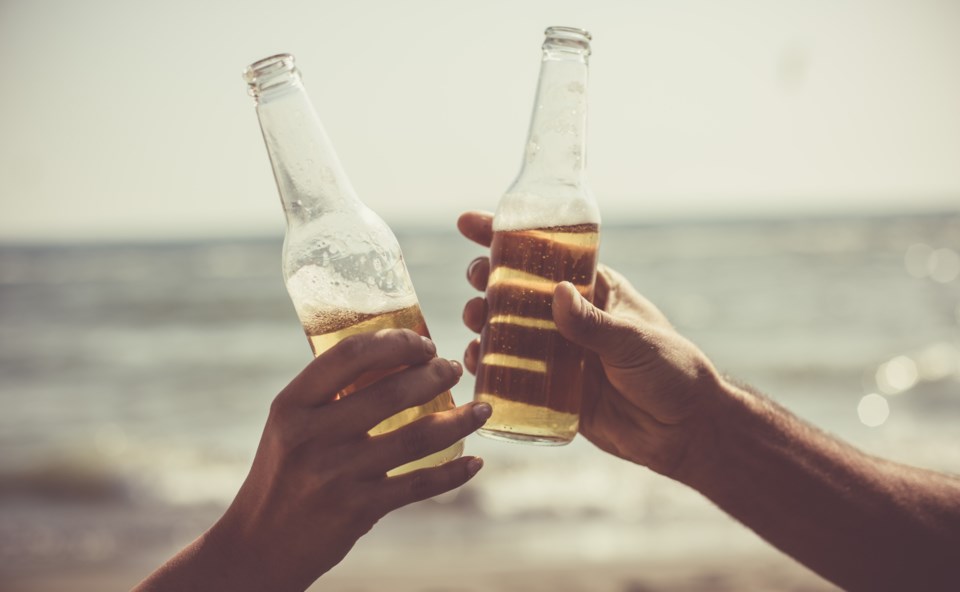When it comes to drinking alcohol, how much is too much?
The standard medical advice for moderate drinking in men is a maximum of three drinks in one day and a maximum of 15 drinks in a week. For women, it’s a maximum of two drinks in one day and a maximum of 10 drinks per week.
No. You can’t get credit because you don’t drink every day by drinking a six-pack on Saturday. The standard guidelines for moderate drinking take into account the capacity of the liver to metabolize or process alcohol. Two drinks for women and three drinks for men is considered the maximum amount women and men’s livers can manage without toxic damage to hepatocytes (liver cells).
Many people think that their drinking is mild or moderate because they “don’t drink the hard stuff” or hard liquor such as vodka, gin or whiskey, but a drink is a drink.
A standard drink is equivalent to a 12-oz can or bottle of beer (which is five-per-cent alcohol), a 5-oz glass of wine (12-per-cent alcohol) or 1.5-oz of spirits (40-per-cent alcohol). A six-pack of beer is just as bad as six glasses of wine or six shots of Scotch.
Though they wouldn’t think of themselves as binge drinkers, many men and women beginning in their teens and 20s exceed their liver’s detoxifying capacity with their social drinking.
Although the cardiac benefits of drinking red wine to raise HDL (or the “good” cholesterol) and provide anti-oxidants have been promoted in the past. These benefits are far outweighed by the damaging effects of alcohol.
Alcohol has been associated with harmful effects on the liver (resulting in fatty liver, hepatitis, cirrhosis and liver failure); damage to heart muscle that can cause heart failure; increased blood pressure and heart rate (increasing the risks of strokes and heart attacks); alteration in the body’s hormone balance; impaired sleep and anxiety, and inflammation of the esophagus or stomach, often experienced as esophagitis (burning in the throat) or gastritis (with upper midline abdominal tenderness).
If you limit your alcohol to the standard limits described in the second paragraph of this article, will you be free of the health risks of alcohol?
The answer is no.
So what is the safest amount of alcohol consumption that will avoid significant risk to your health?
The answer – according to an article published in the Lancet on Aug. 23 – is zero drinks. In the Global Burden of Disease Study, the health and alcohol consumption of people from 195 countries were analyzed.
The study found that between the ages of 15 to 49 for example, alcohol accounted for one in 10 deaths. Alcohol was associated with increased rates of cancer, cardiovascular disease, infections, intentional injuries (e.g. self-harm), traffic accidents, drowning and fires.
Alcohol is toxic to all of our cells. Drinkers are at greater risks for cancers including those involving the liver, colon, rectum, breast, larynx, esophagus and oral cavity.
Although many people have a drink as a nightcap and sleep aid, alcohol is known to worsen normal sleep. It first acts on our brains as a depressant (making us yawn and feel sleepy) but later excites the brain (waking us up and contributing to anxiety). In the same way, alcohol can make depression and anxiety much worse.
So the healthiest dose of alcohol is no drinking at all.
If you’re a moderate almost daily drinker according to the old standards, I challenge you to take on the abstinence challenge. After not drinking for a week or longer, you will likely notice a greater sense of physical and mental wellbeing. My patients often agree that they didn’t know how terrible they felt until they stopped drinking.
Warning: If you are a heavy daily drinker, you should not stop drinking completely but rather taper very slowly to prevent a severe withdrawal reaction or seizure. In many cases, heavy drinkers require the assistance of a detox facility.
To those for whom alcohol is now a part of the fabric of their social and personal lives, my apologies for this sobering news. You now have the opportunity to better manage alcohol and its harm to your health. Moreover, you can influence the peers who have influenced you.
Dr. Davidicus Wong is a family physician. His Healthwise Column appears regularly in this paper. For more on achieving your positive potential in life, see his website at davidicuswong.wordpress.com.


